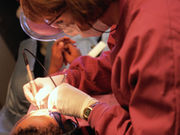Talk Therapy to Tackle Fear of the Dentist
Study found this type of treatment helped many overcome phobias about dental visits.
Many people are familiar with the fear that can precede a visit to the dentist, but new research shows that talk therapy can help when that anxiety becomes a crippling phobia.

In the study, British investigators tried an approach called cognitive behavioral therapy (CBT), a short-term treatment typically involving six to 10 sessions.
"CBT works by providing individuals with skills to address their fear," said researcher.
After the sessions, which focused on replacing negative thoughts with positive ones, the patients took away a set of skills to help tackle their anxiety, expert explained.
"We discuss with them when we discharge them the fact that their anxiety [about dental visits] will come back, but that they know what to do -- don't avoid, take gradual steps and challenge those thoughts," expert said.
The researchers evaluated 130 men and women, average age 40, who all participated in therapy sessions led by a psychologist. About three-quarters were so fearful they had full-fledged dental phobia; the others had anxiety about some aspect of dentistry. Fear of injections and the drill were the most common worries mentioned.
After the therapy, 79 percent of the patients went on to have dental treatment without the need for sedation. Another 6 percent had treatment, but needed sedation. The other 15 percent either withdrew from therapy or were considered not suitable to start therapy due to other issues, the study authors said.
In a previous study in the same journal, found that those with dental anxiety were less likely to visit the dentist and more likely to have cavities and other oral health problems than those who saw a dentist regularly. The researchers also found women more likely than men to fear dentists.
During therapy, patients learned how to identify their fear-related thoughts and replace them with more helpful thoughts. They were armed with information to challenge the unhelpful thoughts. They also learned techniques to cope with the anxiety that is likely once they arrive at the dental office, such as practicing controlled breathing and muscular relaxation, and gradually exposing themselves to what they fear, the researchers said.
The impact of talk therapy has been shown to be long lasting, said expert.
Expert sees therapy as "much more effective than relying on drugs alone [to treat anxiety], because the focus is on teaching patients skills and ways of thinking that profoundly impact how they feel and act".
Among the techniques are distraction, which can include exposing fearful patients to music and stories. Although the training is long lasting, expert said, fear can return and some may need more coaching later. The degree of fear may depend on whether the person is primarily afraid of the dentist or has other psychological problems.
Source: HealthDay News
- 406 reads
Human Rights
Fostering a More Humane World: The 28th Eurasian Economic Summi

Conscience, Hope, and Action: Keys to Global Peace and Sustainability

Ringing FOWPAL’s Peace Bell for the World:Nobel Peace Prize Laureates’ Visions and Actions

Protecting the World’s Cultural Diversity for a Sustainable Future

Puppet Show I International Friendship Day 2020

